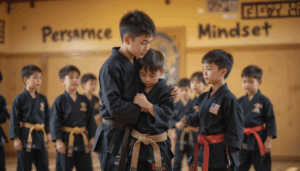This article was last updated on July 08, 2025

In tonight’s world where we want big successes we see kids deal with competition even when they are little in school then all right up till they big kids. Competition can be good. it helps teach important things. But too much pressure can make them feel worried and unsure, can’t it?” What helps is growing a ” perseverance” mindset – this is a way the smart people say can change how kid look at tough stuff and mess ups.
The Two-Edged Sword of Competing
Competing has big upsides when done right:
- Setting goals: Kids learn to make plans and think of how to win
- Handling feelings: Feeling down after not winning helps them learn to deal with difficult emotions
- Working in groups: Knowing what everyone do can build stronger teams, right? professional
- Competition: do we think competition good for making friends since? Or does it, creates problems for kids? The balance is a key captain, isn’t it?
- Performance calibration: Realistic self-assessment against external benchmarks
However, research indicates potential pitfalls when competition becomes excessive:
“Children in hyper-competitive environments show 28% higher cortisol levels and increased avoidance behaviors.”
American Psychological Association – Competitive Stress in Children
The key is balance – enough challenge to motivate growth without triggering chronic stress responses.
Fixed Mindset vs. Growth Mindset: The Foundational Difference
Stanford psychologist Carol Dweck’s groundbreaking research reveals two distinct approaches to learning:
| Fixed Mindset | Growth Mindset |
| Believes abilities are static | Views skills as developable |
| Avoids challenges | Embraces difficulties |
| Feels threatened by others’ success | Learns from others’ achievements |
| Gives up easily | Persists through obstacles |
“Students taught growth mindset principles show 17% higher academic improvement and significantly greater motivation.”
Dweck’s Research at Stanford
Cultivating Growth Mindset: Practical Strategies
1. Reframing Language
Replace outcome-focused praise (“You’re so smart!”) with process recognition:
- “Your practice really paid off in that complex move!”
- “I admire how you tried three different approaches”
2. Normalizing Struggle
Share stories of famous figures’ initial failures:
- Michael Jordan being cut from his high school team
- Einstein’s early academic struggles
- JK Rowling’s multiple rejections
3. The Mistake Ritual
Create family practices that destigmatize errors:
- “Mistake of the Week” discussions
- Error analysis without judgment
- “What did this teach us?” reflections
“Children whose families normalize mistakes show 32% greater risk-taking in learning.”
Child Development Institute – Error Normalization
Martial Arts: The Ideal Growth Mindset Laboratory
Martial arts training provides the perfect environment for mindset development through:
1. Structured Progression Systems
- Belt rankings (extrinsic motivation)
- Personal best tracking (intrinsic motivation)
- Incremental skill scaffolding
2. Embodied Learning
Physical techniques make abstract concepts tangible:
- Falling teaches resilience
- Complex forms demonstrate practice value
- Sparring provides immediate feedback
3. Mind-Body Integration
Our curriculum at North Royalton Martial Arts focuses on:
- Breath control for emotional regulation
- Movement meditation for focus
- Intentional practice for neural rewiring
“Martial arts practitioners show 23% greater persistence in academic settings and enhanced self-regulation.”
Journal of Sports Science & Medicine
Parental Role in Mindset Development
Effective support strategies include:
- Process-focused questioning: “What did you learn?” rather than “Did you win?”
- Modeling growth behaviors: Share your own learning challenges
- Balancing challenge/support: Recognize effort while encouraging stretch goals
- Creating reflection rituals: Weekly growth conversations
Avoid common pitfalls:
- Overemphasizing rankings
- Comparing siblings’ progress
- Rescuing from every discomfort
“Children with growth-mindset parents attempt challenging tasks 42% more frequently.”
Harvard’s Center on the Developing Child
The Competitive Advantage of Growth Mindset
Longitudinal studies reveal individuals with growth mindsets:
- Achieve higher career advancement (31% more leadership positions)
- Show greater innovation (28% more patents/creative output)
- Demonstrate enhanced adaptability during career transitions
- Report higher life satisfaction at all ages
“Growth mindset correlates more strongly with lifetime achievement than IQ or initial talent.”
American Psychological Association – Longitudinal Findings
Your Child’s Mindset Transformation Journey
At North Royalton Martial Arts, our certified instructors specialize in:
- Age-appropriate growth mindset cultivation
- Balancing intrinsic/extrinsic motivation
- Individualized progress tracking
- Family support resources
Begin your child’s transformation today:
Introductory Martial Arts Lesson






